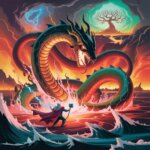
Modern Interpretations of Norse Mythology
Modern Interpretations of Norse Mythology
The rich tapestry of Norse mythology, with its vivid characters and complex narratives, has persisted in the cultural imagination for centuries. From the fierce undertakings of Odin to the looming doom of Ragnarök, these myths have transcended their medieval origins to permeate modern literature, cinema, and art. In this discussion, we’ll explore how contemporary interpretations and adaptations of Norse myths have continued to evolve, shedding light on how these tales retain their relevance in today’s society.
The Influence on Modern Media
Norse mythology has been a fertile ground for creators in various media, influencing everything from blockbuster films to best-selling books. Notably, the Marvel Cinematic Universe has brought characters like Thor, Loki, and Odin into the mainstream with a blend of comic book heroism and mythological elements. These adaptations, while often taking significant creative liberties, have helped spur renewed interest in the original myths, prompting discussions about fidelity to source material and the cultural significance of these deities.
Literary Transformations
Authors of fantasy literature, such as Neil Gaiman with his book “Norse Mythology”, have re-contextualized the old stories for a new audience, often focusing on philosophical and existential themes that resonate today. These narratives are reinterpreted through modern sensitivities and values, leading to reinterpretations that challenge traditional portrayals of heroism, fate, and the nature of the divine.
Educational Perspectives
In academia, Norse mythology is studied not just for its storytelling aspects but also for its insights into the socio-political and religious practices of the Norse people. Modern scholarly discourse explores how these myths reflect the environmental, economic, and social conditions of the time. By analyzing these aspects, educators and scholars foster a deeper understanding of Norse cultural heritage and its influence on Scandinavian identity.
Video Games and Virtual Realities
Video games like “God of War” and “Assassin’s Creed: Valhalla” have also adopted Norse mythology, drawing players in with a visually immersive experience of the ancient Norse world. These games, while primarily entertainment-focused, often encourage players to engage with the mythological themes and historical contexts, offering a dynamic form of cultural education that differs markedly from traditional methods of storytelling.
Challenges and Criticisms
Despite the popularity of these modern interpretations, they are not without their criticisms. Purists argue that too often, the nuances of the original myths are lost in favor of a more sanitized, universally appealing narrative. Moreover, there is an ongoing debate about cultural appropriation and the ethical dimensions of reinterpreting these myths through a modern, often non-Nordic lens.
Conclusion
The continued evolution of Norse mythology in modern media reflects a universal appeal to explore complex questions of existence, power, and morality. Each adaptation, whether faithful or heavily stylized, contributes to the living tradition of these ancient stories, allowing them to resonate with new generations. Navigating the balance between creative freedom and respectful representation will continue to shape how these storied myths are taught, understood, and appreciated in the future.
